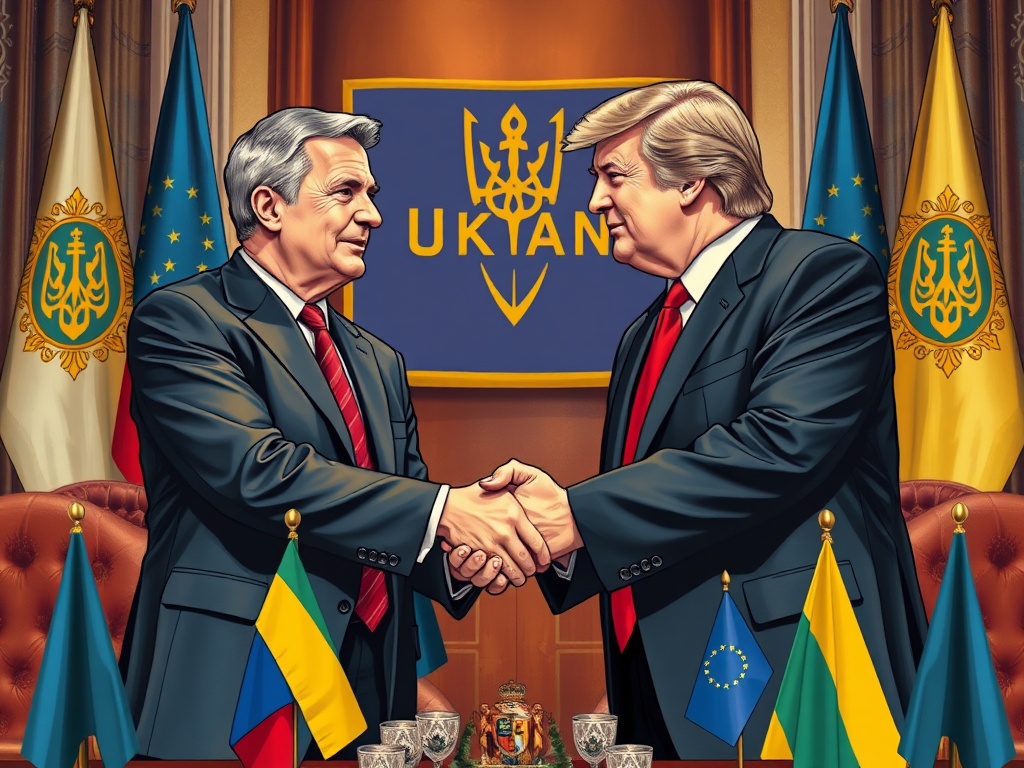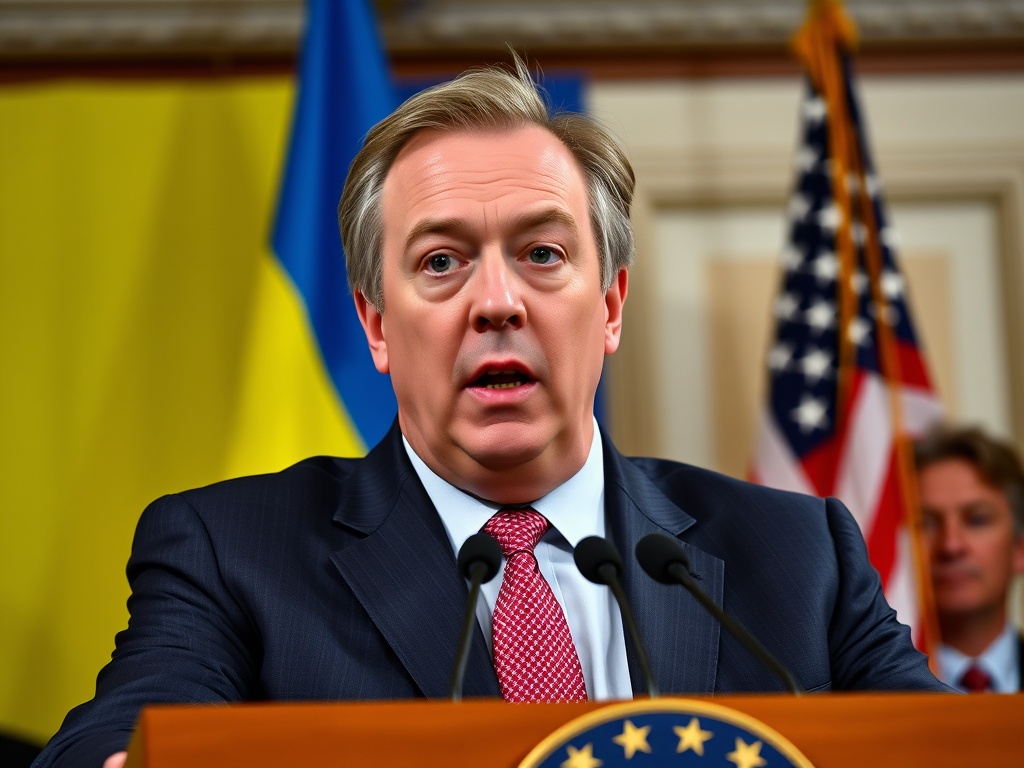Nigel Farage: A Controversial Figure in British Politics
Nigel Farage has long been a polarizing figure in British politics, especially regarding his remarks on Russia and Ukraine. His controversial opinions date back to 2014 when he stated that Russian President Vladimir Putin was the world leader he admired most, describing him as an “operator,” albeit not as a “human being.” While Farage and his political endeavors have often managed to withstand backlash in the past, his close alliance with Donald Trump and fervent support for the former U.S. President’s initiatives to engage in dialogue with Putin over Ukraine have reignited scrutiny from his critics, who view this as a potential liability that could alienate British voters.
Calls for a Timeline on Ukrainian Elections
Thus far, Reform UK, the party led by Farage, has attempted to navigate these treacherous political waters with caution. For instance, when Trump referred to Ukrainian President Volodymyr Zelensky as a “dictator without elections,” Farage countered by asserting that Zelensky is “not a dictator,” while simultaneously advocating for Ukraine to establish a “timeline for elections.” This statement drew criticism from various quarters, including Conservative shadow Defence Secretary James Cartlidge, who deemed it “incredibly trite.” Cartlidge questioned, “Why does Farage think Ukraine should have a ‘timetable’ for elections? They’re in an existential war and don’t know when it will end.” Such comments have led some observers to speculate that Reform UK’s impressive polling—recently placing it ahead of both the Conservatives and Labour nationally—could mask underlying vulnerabilities.
Political analysts and opponents argue that Reform’s support for Trump, its stance on Ukraine, and its views on other contentious issues like climate change—where deputy leader Richard Tice recently dismissed man-made climate change as “garbage”—could pose significant challenges for the party’s electoral prospects.
A Genuine Friendship: Farage and Trump

Farage’s relationship with Trump is not merely political; it is characterized by a genuine friendship. He was a prominent supporter during Trump’s 2016 presidential campaign and was the first UK politician to meet him post-election, famously photographed with him in Trump Tower’s iconic golden elevator. Following their meeting on November 12, 2016, Farage expressed, “It was a great honour to spend time with Donald Trump today.” Their bond is evident, as Trump publicly acknowledged Farage during his recent speech at the Conservative Political Action Conference (CPAC) in Washington, D.C. Trump remarked, “I’ve been his friend for a long time,” and praised Reform’s performance in the general election, suggesting that Farage is poised to excel even further in the upcoming elections, stating, “Thank you, Nigel, what a great guy.”
For his part, Farage has consistently praised Trump, referring to him as “the bravest man I know” during his CPAC address. Nevertheless, Reform’s political rivals perceive this camaraderie as a potential hindrance. A Labour MP from a constituency where Reform performed strongly in the last election remarked, “In general, British people look at Donald Trump and [his ally] Elon Musk and just go ‘that’s completely batshit.’ Because Trump is leaning into that relationship—he spoke about Farage in his [CPAC] speech—and Farage has leaned into it a lot… every outrageous action by the administration becomes a reflection of what these individuals would do in Britain, and it’s bonkers.” Some Conservatives echo these sentiments; one Shadow Cabinet member noted that while some of Trump’s actions have had positive outcomes, the British public may eventually view an alliance with him as a misstep.
The Fallout from Trump’s Controversial Comments
Trump’s recent label of Zelensky as a “dictator” and his unfounded assertion that Ukraine “started” the war with Russia incited global outrage. In the UK, politicians across the spectrum—ranging from Prime Minister Sir Keir Starmer to Tory leader Kemi Badenoch—promptly condemned Trump’s remarks. However, for nearly a day, Reform UK’s MPs remained silent on the issue. Even some supporters of Reform, such as commentator Tim Montgomerie, voiced concerns, stating, “Reform’s silence on Trump and Ukraine must end and end urgently.”
When Farage eventually addressed the controversy, he explained that he had been delayed in responding due to “being on an aeroplane” en route to CPAC. He affirmed that Zelensky was not a dictator and emphasized that “Russia is to blame for the invasion.” However, critics seized upon the delay, with Labour MP Mike Tapp, who represents a constituency where Reform placed second in the last election, commenting, “If you’ve got to sit, wait, observe, check out public opinion before you make a statement, then you’re clearly not in step with British values.”
Given the UK public’s predominantly positive view of Zelensky—65 percent favorable according to a recent YouGov poll—and the overwhelming consensus that Russia is responsible for the conflict, it is unsurprising that Reform UK and other parties distanced themselves from Trump’s remarks. Polling indicates that 77 percent of Britons attribute the primary blame for the war to Russia, while a mere 3 percent believe Ukraine bears significant responsibility.
Reform’s Position on Peace Talks with Putin
Reform has also expressed strong support for Trump’s calls for dialogue with Putin. In Washington, Farage stated, “I applaud President Trump for launching peace negotiations. Our strategy appears to be backing Ukraine for three years into an endless war that they are going to lose at massive cost. I absolutely applaud that he is talking to both sides… the big picture is that Trump is doing a great job.” Meanwhile, Tice took to social media to assert that Trump was “elected on a mandate to deliver peace” and indicated that “everything must be on the table.”
Polling data from last week suggests that the UK public favors a more assertive approach, with 44 percent preferring to support Ukraine until Russia withdraws, even if it prolongs the conflict. Only 31 percent support a negotiated peace that might entail conceding parts of Ukraine to Russia.
Political Ramifications of Reform’s Stance
The party’s endorsement of negotiations with Putin has raised eyebrows among its MPs. A particularly viral interview featured TalkTV’s Julia Hartley-Brewer confronting Tice, asking, “Which part of Britain would you give away if we were invaded and you wanted to negotiate peace?” Tice countered, “None at all.” Hartley-Brewer retorted, “So we wouldn’t give away any of Britain, but it’s okay to give a bit of Ukraine?” Tice responded, “It’s not us giving it away, it’s Ukraine.” Hartley-Brewer quickly shot back, “Ukraine doesn’t want to give it away.”
Reform’s opponents have jumped on these remarks, with Liberal Democrat leader Sir Ed Davey branding Farage a “Trump bootlicker” and “plastic patriot.” Tapp, a former soldier who served in Iraq and Afghanistan, likened Reform’s stance to that of Jeremy Corbyn’s group, asserting, “It’s quite clear that they don’t stand up for British values.”
Farage’s Past Comments on Putin and Ukraine
Vladimir Putin
In a 2014 interview with GQ, Farage was asked which current world leader he most admired. He responded, “As an operator, but not as a human being, I would say Putin… The way he played the whole Syria situation. Brilliant. Not that I approve of him politically. How many journalists are in jail now?” When revisiting this remark in 2024, he clarified, “I said I disliked him as a person, but I admired him as a political operator because he’s managed to take control of running Russia.”
Ukraine
Farage has made provocative statements regarding Ukraine over the years. During a 2014 debate with Nick Clegg, he accused the EU of pursuing an “imperialist, expansionist” policy in Ukraine, asserting, “I think the EU frankly does have blood on its hands in Ukraine.” On the day Russia invaded Ukraine in 2022, Farage tweeted, “Putin has gone much further than I thought he would,” attributing it to “a consequence of EU and NATO expansion.” In a June 2024 BBC interview, he suggested that NATO’s eastward expansion gave Putin justification to go to war, declaring, “We’ve provoked this war; of course it’s [Putin’s] fault, but he’s used what we’ve done as an excuse.” When confronted by Robinson about whether NATO provoked the invasion, Farage replied, “Yes.”
In a subsequent Daily Telegraph column, Farage sought to clarify his position: “[The] invasion of Ukraine was immoral, outrageous and indefensible. As a champion of national sovereignty, I believe that Putin was entirely wrong to invade the sovereign nation of Ukraine. Nobody can fairly accuse me of being an appeaser… If you poke the Russian bear with a stick, don’t be surprised if he responds.”
Climate Change Stance
In a recent interview with Sky News, Richard Tice was asked about his beliefs regarding man-made climate change. He replied, “Look, climate change is real, has gone on for millions of years, always will… The arrogant naivety of people who think that you can stop the power of the sun, stop the power of volcanoes.” When pressed about the UN Intergovernmental Panel on Climate Change’s findings, he dismissed them as “absolute garbage,” claiming a lack of evidence supporting the assertion that man-made CO2 significantly influences climate change. Tice added, “There are loads of scientists who are terrified to speak because they won’t get any research funding if they tell it as it is.”
Pollsters are divided on the implications of Reform’s positions. Anthony Wells from YouGov commented, “I don’t think closeness to Trump is particularly damaging them,” suggesting that foreign affairs are not as pivotal in voter decision-making compared to issues like the economy and immigration. However, Luke Tryl from the More in Common think-tank cautioned that voters might view Farage’s association with Trump as indicative of instability, especially if Trump’s foreign policy leads to negative outcomes for the UK.
As Reform UK attempts to transition from building momentum to establishing credibility, some of their recent public statements may hinder this goal.
Reform’s Climate Change Policies
In a press conference earlier this month, Reform UK unveiled a series of policies aimed at dismantling net-zero targets, including a “windfall tax on renewable-generated power” and a “solar farm tax on farmers taking the renewable subsidy.” Critics have expressed skepticism about the feasibility of their plans, arguing that replacing pylons with underground cables would increase energy costs. Furthermore, many have questioned the rationale behind taxing renewable energy instead of simply withdrawing subsidies.
According to polling conducted by More in Common, Reform UK appears to be out of touch with public sentiment regarding climate change. While the party emphasizes its commitment to lowering energy bills, many voters— including those who supported Reform—are significantly more inclined to favor renewable investment rather than oppose it. Overall, only 24 percent of the public trust Reform on climate issues, reflecting a need for the party to recalibrate its positions to align with broader public opinion.




